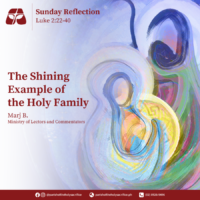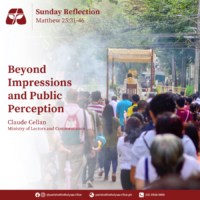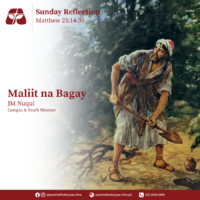Sunday Gospel Reflection
16th Sunday in Ordinary Time
Luke 10:38-42 | July 17, 2022
How Do You Say “I Love You”?
JM Nuqui, Campus Minister
Sabi nila marami daw klase ng love language. Yung paraan para ipakita mo na mahal mo ang isang tao. Pwedeng sa pagreregalo ng materyal na gamit, maaring sa pisikal na paraan, pagsasabi ng magagandang salita, pagseserbisyo, o di kaya pagbibigay ng oras sa mga mahal natin. And I’m sure you know very well the language you “speak.” As we grow old, we realize our parents’, ate’s and kuya’s love languages. Engaging deeper in a relationship, we discover our partner’s unique expression of love. And it isn’t always through the words “I love you” right?
My sisters and brothers, we hear in today’s Gospel the story of Mary and Martha. Often compared against each other, we nonetheless find and recognize in both their unique ways of expressing their love. Doing acts of service—yung pagiging maasikaso at aligaga sa kusina—is probably Martha’s love language. Siguro sa bawat pagkakataon na kasama niya si Hesus, lagi niyang pinagluluto at pinaglilingkuran si Hesus. Mary, on the other hand, expresses her love through attentiveness, active listening, and her staying presence. Na sa tuwing nariyan si Hesus, binibigay ni Maria ang lahat ng kanyang oras at atensyon sa pakikinig kay Hesus.
But you see my dear friends, Jesus accepts the love that Mary and Martha offer. He didn’t stop Martha from doing her stuff and running around in the kitchen. He also didn’t force Mary to stand and help Martha with the work. Nauunawaan ni Hesus ang pamamaraan natin ng paghahayag ng pag-ibig. Tinatanggap ni Hesus ang pag-ibig na kaya at handa nating ibigay. The Lord surely understands the love language we speak, no matter how incomplete, insincere, and blurry it may be sometimes.
Because at the heart of it all is the truth that God has loved us first. Palagi namang ganun. Laging nauuna ang Diyos. Bago pa man tayo makapagbigay ng sarili sa Diyos, bago pa man nating matutunang mahalin ang Diyos, nauna na Niya tayong minahal. Looking back at the life and ministry of Jesus, we see that he’s fluent and articulate in all the love languages. From gifting the couple at Cana with wine to his acts of service through healing and miracles, from his words of charity and affirmation to the people around to spending quality time with sinners and outcasts, and from touching those considered unclean to allowing himself be touched—laging nauna at nanatiling tapat sa kanyang pag-ibig si Hesus.
To Martha’s cooking and service, the Lord says thank you.
To Mary’s attentive listening, the Lord also expresses gratitude.
Sa patuloy na pagsusumikap sa pag-aaral, we hear the Lord telling us, “thank you.”
Sa mga pagkakataon na pinili magpatawad kaysa maghiganti,
In our continuous self-offering for our family,
In the many spontaneous coffee dates and late night talks listening to each other’s stories;
At sa mga iba’t ibang paraan natin ng pagpapahayag ng pagmamahal, the Lord lovingly takes and receives.
The Common Preface IV in the Missal prays,
“You have no need of our praise.
Yet our desire to thank You is itself Your gift.
Our prayer of thanksgiving adds nothing to Your greatness
But makes us grow in Your grace.”
While God’s love for us and our love of God is both important, tatandaan natin na laging nauuna ang Diyos. We are able to love because He first loved us. Ang pag-ibig ng Diyos hindi kailangan kitain o bilhin sapagkat ito ay bigay at libre. Sobra sobra pa. We need not to compare one expression and language of love from the other because the Lord takes what we can offer. We all have our different expressions and languages of love sapagkat naranasan natin kung paano tayo mahalin ng Diyos.
Still, the call to love God and neighbor remain. Napakaraming paraan ng pagpapahayag ng pag-ibig. Ikaw, paano mo sasabihin?


